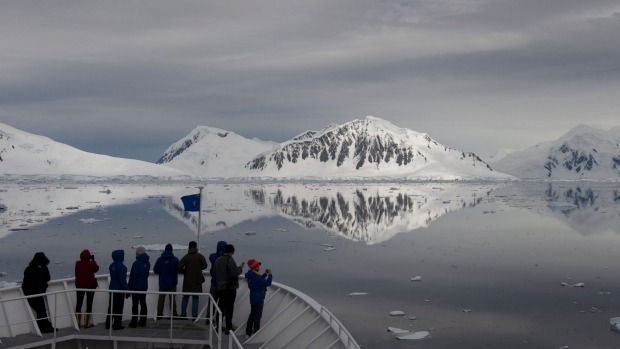
It's the morning after the big night before; a night when the wind suddenly strengthened, the rain swept in and the swell rose, two, three, four metres, causing even our beautifully balanced luxury ship, Le Boreal, to rock and roll a little.
Well-laid plans to wake up at four o'clock and celebrate the symbolic crossing of the Antarctic Circle were abandoned, as travellers sensibly elected to enter this, the highest, coldest, driest continent on earth, in horizontal mode.
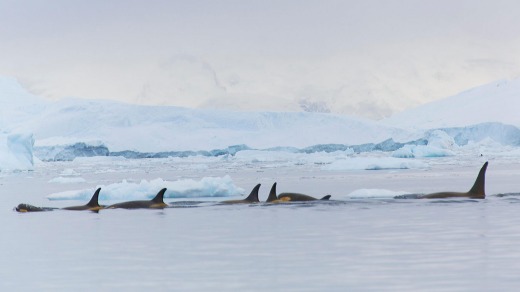
When it comes to weather, a few hours is a long time in such southern latitudes. So much can change, so quickly.
So it is that those rising at six o'clock, or even earlier, pull back the blinds, peer through the windows of their cabins, to discover… wow! Overnight, the seascape has been transformed into a whole new waterworld, a wonderland that stretches as far as sleepy eyes can see.
Welcome to Crystal Sound, named by the UK Antarctic Place-Names Committee in recognition of the research undertaken hereabouts into the structure of ice crystals.
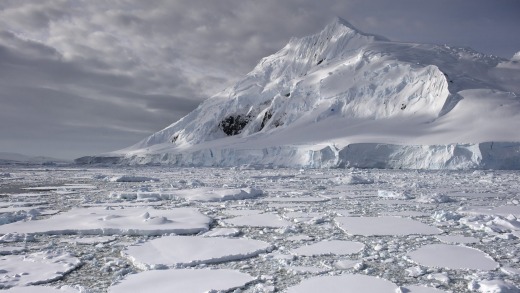
The sound shimmers under a watery sun and streaky blue skies: seemingly still, eerily shiny, and, most striking of all, utterly silent.
But wait. On closer inspection, through the binoculars, something is moving. Despite first appearances this is a world in motion, albeit slowly.
There are birds, notably Wilson's storm petrels, circling overhead. From the left, a small raft of penguins, probably Adelie, comes porpoising across a patch of open water. And there, to the right, what looks like a shadow is revealed to be a pair of crab-eater seals, lazily stretching out in the morning sun.
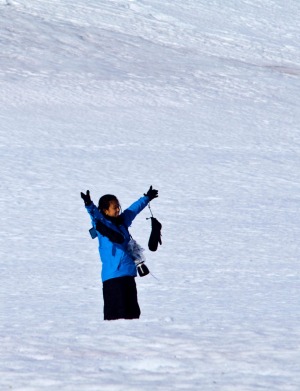
Ironically, Crystal Sound was not on the original itinerary, but chosen overnight by Le Boreal's French captain, Erwann Le Rouzic, after the original stopping place, appropriately named The Gullet, was closed down. The move, like all others taken in discussion with the two imaginative and energetic tour directors, Sally Austin and Rikus Visser, proves to be a big winner.
Breakfast has barely finished before an armada of inflatable Zodiac boats lines up behind the ship, waiting to take as many as 188 guests on an expedition across Crystal Sound. We are divided into two groups, green and gold. Today, it's the turn of the gold group to go first.
It sounds a clunky system: jumping into beanies, boots and bright, red parkas; festooning oneself with cameras, binoculars, sketch pads and the such like; checking out, and later in, on the ship's computer; meticulously washing one's boots both outgoing and incoming; and, clambering aboard a bouncing rubber-duckie.
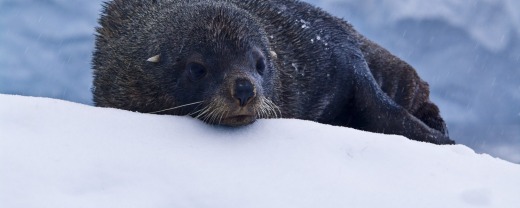
But it works. No one was lost. No one fell overboard. No one, be they 17 or 84 – the guest age-range – missed out.
Each Zodiac group is accompanied by one of 10 naturalists, historians and other experts, recruited from Argentina, France, Britain, Russia, Switzerland, Austria, Canada, the Ukraine and elsewhere. They host the expeditions as well as participating in daily pre-dinner lectures and recaps on what we have seen and done during the day.
This sunny, sparkly morning – the temperature outside is hovering around a balmy zero – our guide is Chris Edwards. A large, charismatic Scotsman, he makes clocks back in Aberdeen when he is not travelling. He talks enthusiastically about the history, geology, and flora and fauna of Antarctica.
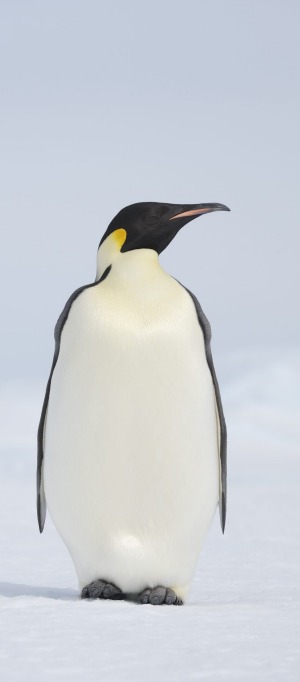
We half expect him to jump into the Zodiac in an open-necked shirt and the kilt he wears for more formal occasions onboard the ship. But he is togged up much like the rest of us, apart, that is, from his hat, which is in the shape and colours of a comical, flappy-winged penguin.
Such is his love of everybody's favourite bird. "I bought it in a children's shop. I knew how much people love anything to do with penguins," says Edwards, who is making a return trip to Crystal Sound more than 20 years after visiting it with a team of huskies.
His reference is reminiscent of the century-old Endurance Diary of the Australian photographer Frank Hurley, whose poem Antarctic Alphabet begins:
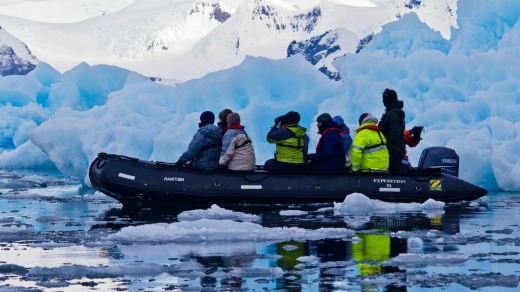
Today, there are no dogs, no blizzards, no fierce blows, as our group slowly, stealthily and respectfully explores a place of breathtaking beauty, the experience enhanced by Edwards's commentary.
"Antarctica is not a holiday destination," he explains later. "It's a spiritual experience. It's not about lying around in deckchairs, drinking gin and tonics. I've seen people fall flat out on the snow and lie there for several minutes just taking it all in. That's how I feel."
Reverentially, he describes the life cycle of the icebergs, shining sky-blue, slowly melting in the late summer warmth. He explains their categories: from city-sized ice-islands through giant icebergs, bergy bits and growlers to the more bitty brash.
He points out more seals, penguins and birds, including the fulmars, sheathbills, kelp gulls and the brown skuas, scavengers that can be seen in among penguin colonies, pecking at the remains of short-lived penguin pups.
He answers dozens of questions. "Would you die if you fell in the water?" someone asks. Basically, the answer is "no", though it depends on how long it takes to fish you out, he replies.
"On one trip, I took out a group of schoolgirls who had a game to see who could keep their hands in the water the longest. They didn't keep it up for long. Then again, we have had people who want to go for a swim off the back of the ship. That's OK, but I wouldn't recom…"
His words trail off, as a message comes crackling off his two-way radio. Great news. From high on the bridge of Le Boreal, the captain has spotted a penguin. A rare emperor penguin, at about 1.1 metre tall, bigger than the king penguin it's the biggest in the world.
Everyone aboard the Zodiac gets a glimpse of the big bird before it disappears from sight in the deep, snowy distance. Edwards is elated. "You're so, so lucky. You could come here… what? Fifty, a hundred times, and never see an emperor in this area."
Someone else points out that hard-core penguin enthusiasts, anxious to see all 17, or 18 species – experts are divided over classifications – are prepared to pay anything up to $15,000 to tick off an emperor, to "complete" their set.
As our Canadian expert Dr John Chardine says, echoing the thoughts of generations of enthusiasts, "To us they seem comical, cute, cheeky. Strictly that's anthropomorphic – the attribution of human characteristics to other non-humans.
"But there's no doubt, penguins are habit forming". So, too, of course are humpbacks and, for some specialists even leopard seals, killer whales and the krill, the crustaceans upon which the local penguins, whales and seals feed.
For an hour or so we drift dreamily through the icefields, pilgrims in a natural wonderland that instils in many an almost religious experience, a reverence for a precious, timeless place. Such a feeling must have been experienced by visitors for several centuries.
As Herman Melville , author of the classic Moby Dick, wrote, of a sailor beholding the Antarctic scenery, "At times, by some infernal trick of legerdemain in the powers of frost and air, he, shivering and half-shipwrecked… views what seems a boundless churchyard grinning upon him with its lean ice monuments and splintered crosses".
All too soon it is time to return to the ship, but not before everyone on the Zodiacs is served by a shivering waiter in white shirt and tuxedo, with a flute of Champagne in celebration of our arrival in Antarctica. It is a short, convivial moment, conducted entirely in line with all Antarctic conventions.
Then it's back to the ship and its many luxuries, talks and entertainments, all included in the tour price. There's time, first, for a hot chocolate, then lunch, followed by a lie-down, or a spin on the treadmill to run off a few calories.
By mid-afternoon, it's time for the afternoon excursion, as the ship moves onto a new location, a new adventure, a new place of wonder. Some, such as the literally breathtaking, kilometre-long hike up and down the snow-covered mountain that looms above Neko Harbour, are planned. Other destinations, other events are altogether unplanned, sometimes because of inclement weather, but more often because the captain and the two flexible tour directors have spotted the unexpected, the more interesting.
One evening, just as the Continents musical show begins in the cinema, which also hosts daily debriefings and movies ranging from the classic penguin cartoon Happy Feet to a documentary on heroic polar explorer Ernest Shackleton, there is a sudden commotion. Cries of "Orcas! Orcas to starboard!"
Le Boreal comes to a halt as we rush to our fourth-floor stateroom overlooking the starboard-side and throw open the windows. Beneath us, four orcas, otherwise known as killer whales, are attacking a humpback whale that has likely been separated from the rest of the pod.
"Right before us we were witnessing the top predator of the seas in action," Argentinian naturalist Miguel Rubio reports afterwards. "Within minutes the sea was covered in fat and blubber. The birds had come in to scavenge."
Messy maybe, but it is a timely, up-close and candid reminder that even beneath the calmest seas, on the brightest of nights, in picture-postcard conditions, nature is still to be found red in tooth and claw.
scenictours.com.au
Scenic's Antarctic tours start from Ushuaia, on the southern-most tip of Argentina. Lan and Qantas are among carriers offering connection options from Australia via Buenos Aires.
The Scenic Tours "Ultimate Antarctica Cruise" explores the icy peninsula, visiting Port Lockroy, Deception Island, Crystal Sound and other attractions by inflatable Zodiacs – depending on sea conditions – over 10 luxury nights. There are three departure dates in the next, 2016, season: February 3, 13 and 17. The price is $12,895 per person, twin share.